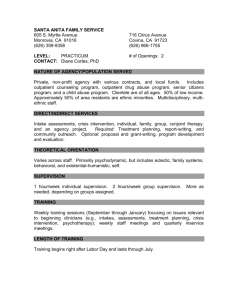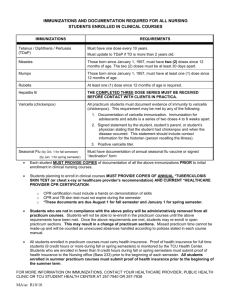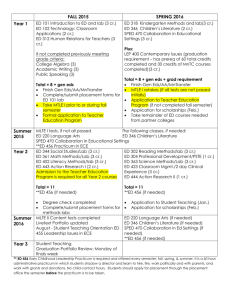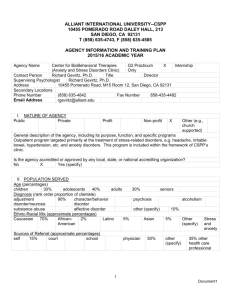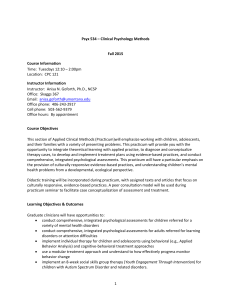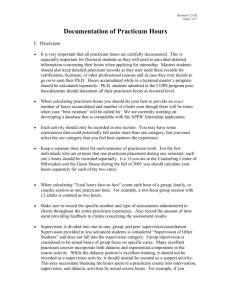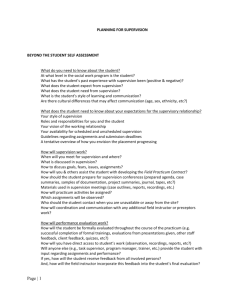PSYX 534-01 - Applied Clinical Methods
advertisement
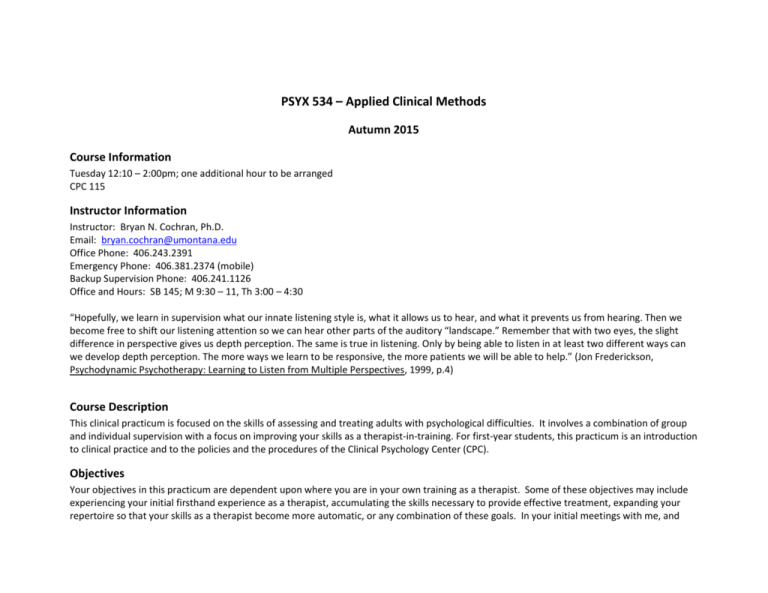
PSYX 534 – Applied Clinical Methods Autumn 2015 Course Information Tuesday 12:10 – 2:00pm; one additional hour to be arranged CPC 115 Instructor Information Instructor: Bryan N. Cochran, Ph.D. Email: bryan.cochran@umontana.edu Office Phone: 406.243.2391 Emergency Phone: 406.381.2374 (mobile) Backup Supervision Phone: 406.241.1126 Office and Hours: SB 145; M 9:30 – 11, Th 3:00 – 4:30 “Hopefully, we learn in supervision what our innate listening style is, what it allows us to hear, and what it prevents us from hearing. Then we become free to shift our listening attention so we can hear other parts of the auditory “landscape.” Remember that with two eyes, the slight difference in perspective gives us depth perception. The same is true in listening. Only by being able to listen in at least two different ways can we develop depth perception. The more ways we learn to be responsive, the more patients we will be able to help.” (Jon Frederickson, Psychodynamic Psychotherapy: Learning to Listen from Multiple Perspectives, 1999, p.4) Course Description This clinical practicum is focused on the skills of assessing and treating adults with psychological difficulties. It involves a combination of group and individual supervision with a focus on improving your skills as a therapist-in-training. For first-year students, this practicum is an introduction to clinical practice and to the policies and the procedures of the Clinical Psychology Center (CPC). Objectives Your objectives in this practicum are dependent upon where you are in your own training as a therapist. Some of these objectives may include experiencing your initial firsthand experience as a therapist, accumulating the skills necessary to provide effective treatment, expanding your repertoire so that your skills as a therapist become more automatic, or any combination of these goals. In your initial meetings with me, and throughout the semester, we will meet to discuss your training needs. We will set several clear, definable goals for your training for the semester and will review these periodically during the practicum. In addition to your individual goals, you can expect to improve your skills in making an accurate clinical diagnosis, formulating a case conceptualization, designing a treatment plan, modifying this plan to meet the changing needs of your clients, and documenting your work with your clients. During the year, you will also be exposed to different models and methods of supervision, and you are expected to attain a beginning-level competency in understanding the supervision process. Grading/Evaluation The grading system for this course is credit/no credit. I will encourage you to evaluate your own work in our individual meetings, and I will provide you with feedback in an effort to improve your clinical skills. In order to receive credit for the course, you must follow all of the policies and procedures outlined in the CPC handbook. At the end of the semester, you will receive a detailed evaluation of your progress, which we will discuss in individual supervision. Attendance You are expected to attend all group and individual supervision sessions, as well as in-service trainings and CPC staff meetings. Exceptions should be arranged with me in advance, if at all possible. Requirements For this practicum, you are expected to carry a clinical caseload of 3-4 clients at a time. All new client assignments will be discussed in your meetings with me before an assignment is made. You are expected to attend all CPC staff meetings, which occur on a monthly basis. During these meetings, you will receive additional information about topics relevant to the CPC, including the supervision process (see Practicum Syllabus Addendum). Meetings that cover this topic will include pre- and posttests to assess your knowledge of supervision. Additionally, you are expected to learn and follow all clinic guidelines and procedures. This includes your responsibilities regarding the consent process, intake/termination, fee setting and collection, etc.. Maintenance of appropriate records (and timely completion of documentation) is required. I will review all of your client intake, progress, and termination notes, as well as any assessment reports, and will co-sign all notes that go into your clients’ records. Course Materials You may anticipate that in this practicum, we will select readings (clinical case examples, theoretical chapters, and possibly empirical articles) relevant to the experience of being a therapist-in-training. I have deliberately chosen to not establish a “reading list” before the semester starts. Rather, I would like to tailor these readings to the needs of the group as they emerge. All reading materials will be made available through the library’s electronic reserve system or will be distributed as photocopies in class. It is likely that you will choose relevant readings on your own during the practicum. In order to document your reading choices (as well as the readings that we select as a group), I am asking that you maintain a bibliography of materials that you read throughout the year. This bibliography will be due at the end of the spring semester. In keeping with the spirit of the course, it will not be graded, but it will be a helpful list for you as you prepare for comprehensive examinations, internship applications, or other training experiences. An optional “assignment” for this practicum, and one from which I believe you might benefit immensely, is a journal of your experiences as a therapist. This is, of course, separate from your psychotherapy notes and would focus on your personal growth and your reactions to training experiences. Course Guidelines Disability Modifications The University of Montana assures equal access to instruction through collaboration between students with disabilities, instructors, and Disability Services for Students. If you think you may have a disability adversely affecting your academic performance, and you have not already registered with Disability Services, please contact Disability Services in Lommasson Center 154 or call 406.243.2243. I will work with you and Disability Services to provide an appropriate modification. Academic Misconduct You are expected to adhere to the University of Montana Student Conduct Code with regard to academic integrity. Academic misconduct in this course will result in an academic penalty commensurate with the offense as well as possible disciplinary action by the university. Incompletes Departmental and university policies regarding incompletes do not allow changing “incomplete” grades after one year has passed since the “I” was granted.
